
The streaked xenops is a passerine bird in the Furnariinae subfamily of the ovenbird family Furnariidae. It is found in the New World from Costa Rica and Trinidad south to Bolivia and Argentina.

The streaked tuftedcheek is a passerine bird in the Furnariinae subfamily of the ovenbird family Furnariidae. It is found in Bolivia, Colombia, Ecuador, Peru, and Venezuela.

The plain xenops is a passerine bird in the Furnariinae subfamily of the ovenbird family Furnariidae. It is found in the tropical New World from southern Mexico south as far as northern Bolivia and east across Brazil.
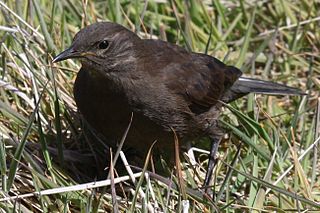
The blackish cinclodes is a Near Threatened passerine bird in the Furnariinae subfamily of the ovenbird family Furnariidae. It is found in Argentina, Chile, and on the Falkland Islands, where it is known as the tussac-bird or tussock-bird.

The scaly-throated foliage-gleaner, also known as the spectacled foliage-gleaner, is a species of bird in the Furnariinae subfamily of the ovenbird family Furnariidae. It is found in Mexico, in every Central American country except Nicaragua, and in Colombia and Ecuador.

The white-winged cinclodes is a species of bird in the Furnariinae subfamily of the ovenbird family Furnariidae. It is found in Argentina, Bolivia, Chile, and Peru.

The Cordoba cinclodes or Comechingones cinclodes is a species of bird in the Furnariinae subfamily of the ovenbird family Furnariidae. It is endemic to Argentina.

The buff-winged cinclodes is a species of bird in the Furnariinae subfamily of the ovenbird family Furnariidae. It is found in Argentina, Brazil, Chile, Paraguay, Uruguay and as a vagrant on the Falkland Islands.

The grey-flanked cinclodes, formerly known as Oustalet's cinclodes, is a species of bird in the Furnariinae subfamily of the ovenbird family Furnariidae. It is found in Argentina and Chile.

The Peruvian seaside cinclodes or surf cinclodes is a species of bird in the Furnariinae subfamily of the ovenbird family Furnariidae. It is endemic to Peru.

The chestnut-winged foliage-gleaner is a species of bird in the Furnariinae subfamily of the ovenbird family Furnariidae. It is found in Bolivia, Brazil, Colombia, Ecuador, Peru, and Venezuela.

The rufous-tailed foliage-gleaner is a species of bird in the Furnariinae subfamily of the ovenbird family Furnariidae. It is found in Bolivia, Brazil, Colombia, Ecuador, Guyana, Peru, Suriname, Venezuela, and possibly French Guiana.
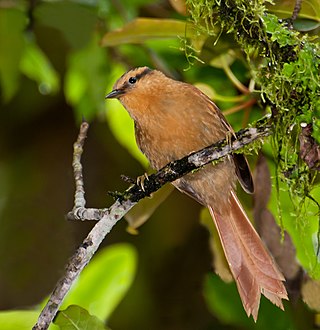
The buff-fronted foliage-gleaner is a species of bird in the Furnariinae subfamily of the ovenbird family Furnariidae. It is found in Argentina, Bolivia, Colombia, Costa Rica, Ecuador, Panama, Peru, and Venezuela.

The grey-throated leaftosser is a Near Threatened species of bird in the subfamily Sclerurinae, the leaftossers and miners, of the ovenbird family Furnariidae. It is found in Bolivia, Brazil, Colombia, Costa Rica, Ecuador, Panama, Peru, Trinidad and Tobago, and Venezuela.

The black-tailed leaftosser is a species of bird in the subfamily Sclerurinae, the leaftossers and miners, of the ovenbird family Furnariidae. It is found in Bolivia, Brazil, Colombia, Ecuador, French Guiana, Guyana, Peru, Suriname, and Venezuela.
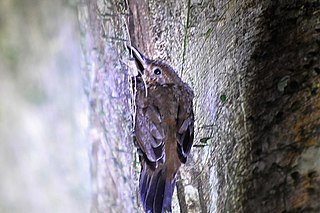
The short-billed leaftosser is a species of bird in the subfamily Sclerurinae, the leaftossers and miners, of the ovenbird family Furnariidae. It is found in Bolivia, Brazil, Colombia, Ecuador, French Guiana, Guyana, Peru, Suriname, and Venezuela.

The ocellated woodcreeper is a species of bird in the subfamily Dendrocolaptinae of the ovenbird family Furnariidae. It is found in Bolivia, Brazil, Colombia, Ecuador, Peru, and Venezuela.
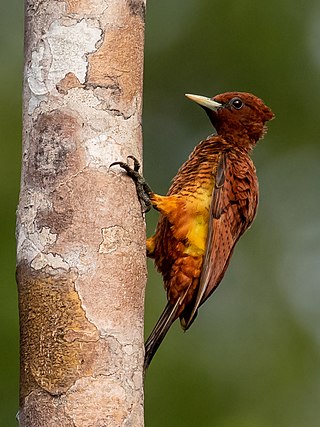
The scaly-breasted woodpecker, also known as the scale-breasted woodpecker, is a subspecies of bird in subfamily Picinae of the woodpecker family Picidae. Some taxonomists consider it a separate species. It is found in Bolivia, Brazil, Colombia, Ecuador, Peru, and Venezuela.

The Pacific tuftedcheek is a passerine bird in the Furnariinae subfamily of the ovenbird family Furnariidae. It is found in Colombia and Ecuador.
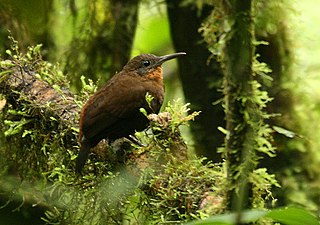
The dusky leaftosser or South American leaftosser is a bird in subfamily Sclerurinae, the leaftossers and miners, of the ovenbird family Furnariidae. It is found in Bolivia, Brazil, Colombia, Ecuador, French Giana, Guyana, Panama, Peru, Suriname, and Venezuela.























